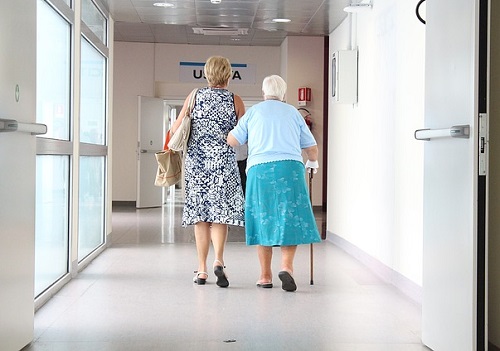 Is taking a senior loved one to the doctor one of your hallmark caregiver duties? In addition to medication management and financial assistance, providing transportation to and from the doctor (as well as specialists, lab work, etc) is one of the most common tasks caregivers help with.
Is taking a senior loved one to the doctor one of your hallmark caregiver duties? In addition to medication management and financial assistance, providing transportation to and from the doctor (as well as specialists, lab work, etc) is one of the most common tasks caregivers help with.There are many benefits to attending a doctor’s appointment with your loved one including:
-
Getting the most up-to-date information regarding health conditions, preventative screenings, medications, etc.
-
Allowing you to voice questions and concerns in person with medical staff and get answers right away
-
Simplifying the process of having the doctor refill a prescription or write an order for a new one
-
Giving you the chance to schedule future appointments that work with your’s and your loved one’s schedule
The truth is, however, that doctor’s appointments can be overwhelming undertakings, especially if your loved one is ill (which is why you are seeing the doctor in the first place) or if they have a disability. Transferring in and out of the car can take extra time and effort as can remembering to pack everything for you both need (i.e. eyeglasses, water bottle, medicines, etc.).
If you’re fed up with the chaos of your loved one’s doctor’s appointments, check out this essential caregiver checklist for next time.
Prepping the Night Before
A little preparation can go a long way towards preventing common doctor’s appointment headaches. Specifically, start with what you need to make sure you bring for your loved one:
-
Identification card
-
Insurance card
-
List of medications with doses and frequencies, i.e. Warfarin, 10 mg, 1x/day
-
Any medications they made need to take during the appointment time*
-
Payment method (especially if your loved one has their own account or HSA card they use for medical expenses)
-
Change of clothing and extra adult briefs (if applicable)
-
Health metrics (if you have been tracking symptoms, blood pressure, blood sugar, temperature, etc.)
-
Snacks/water bottle in case appointment goes long
-
Cardigan or another light jacket (doctor’s offices can be cold!)
*Any caregiver knows that doctor’s appointments can either happen right on time or run hours late. Don’t get caught off-guard without your loved one’s medicine if you’re at the doctor longer than you expected. Always bring back-up doses to stay on schedule.
Transportation
Does your loved one use a mobility aid like a power chair or mobility scooter to get around the house? Unless you have a specialty lift on your car, chances are you are utilizing a lighter weight manual wheelchair or walker for the doctor’s appointment that travels easier.
Make sure that you have the necessary mobility aids handy for your loved one’s appointment as well as room in the car for storing them during transit. You may also want to think about utilizing car transfer aids like car caddies or swivel seats to make it easier for your loved one to get in and out of the car.
Make sure that you have the necessary mobility aids handy for your loved one’s appointment as well as room in the car for storing them during transit. You may also want to think about utilizing car transfer aids like car caddies or swivel seats to make it easier for your loved one to get in and out of the car.
Don’t forget to put the doctor’s name and address in your smartphone as well just in case you running late and need to map out the fastest route and call the doctor’s office to let them know.
Cold and Flu Season Reminders
Be mindful of attending crowded doctor’s offices during cold and flu season if you can avoid it. Older adults are naturally more vulnerable to getting sick and the flu can be life-threatening. If you absolutely have to go into the doctor during the late fall and winter months, don’t forget important items like:
-
Hand sanitizer
-
Travel Kleenex
-
Vaccination records (talk to your loved one’s doctor about getting the flu and pneumonia vaccines)
-
Personal reading material (to avoid touching community magazines)
-
Cold weather protection (coats, gloves, scarves, etc)
If possible, consider keeping your loved one out of the office by scheduling a virtual appointment with a doctor. Telehealth, or the servicing of medical care via a 2-way telecommunications application (with live video and audio feeds), is becoming more and more popular with private insurance companies and now even Medicare Part B will cover some instances of telehealthcare for rural patients.
Final Thoughts
One of the final and most important checklist items for caregivers who take their loved ones to their doctor’s appointments is writing down your questions and concerns and bringing them with you. Whether you’re wondering about new symptoms that have shown up, about medicine side effects, about your loved one’s nutrition, you name it, it is critical that you speak up and get answers when you have the chance with your loved one’s doctor.
Jotting down questions, ideas, and concerns not only shows the doctor that you are serious about your loved one’s care, but it also prevents you from forgetting something important that you wanted to bring up with the doctor.


Comments